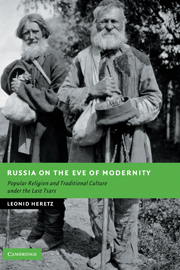Book contents
- Frontmatter
- Contents
- Acknowledgments
- Introduction
- 1 The traditional worldview
- 2 The Old Believers: modernization as apocalypse
- 3 The sectarians: dualism and secret history
- 4 Folk eschatology
- 5 The assassination of Alexander II (1881) and folk Tsarism
- 6 The year of famine and cholera (1891–1892): demonization of the nobility
- 7 The Japanese War: peasant Russia and the wider world
- 8 1905: revolution or reaction?
- 9 The Great War and the crisis of the traditional culture
- Epilogue
- Bibliography
- Index
- NEW STUDIES IN EUROPEAN HISTORY
2 - The Old Believers: modernization as apocalypse
Published online by Cambridge University Press: 23 December 2009
- Frontmatter
- Contents
- Acknowledgments
- Introduction
- 1 The traditional worldview
- 2 The Old Believers: modernization as apocalypse
- 3 The sectarians: dualism and secret history
- 4 Folk eschatology
- 5 The assassination of Alexander II (1881) and folk Tsarism
- 6 The year of famine and cholera (1891–1892): demonization of the nobility
- 7 The Japanese War: peasant Russia and the wider world
- 8 1905: revolution or reaction?
- 9 The Great War and the crisis of the traditional culture
- Epilogue
- Bibliography
- Index
- NEW STUDIES IN EUROPEAN HISTORY
Summary
Although the majority of Russians in the late Imperial period were members of the official Orthodox Church, a significant minority rejected the state religion and strived to maintain Orthodoxy as they understood it in a welter of dissident groupings known collectively as the Old Belief. Although there were many things that set the Old Believers apart from the majority, in some ways they manifested the tendencies of the general culture in particularly acute forms. In particular, the Old Believer Schism represents the basic Russian negative response to modernization. In its desperate attempt to create and define an ideal of Russian tradition and in its concomitant rejection of Western ways in their entirety, the Old Belief foreshadowed in every essential question the development of “modern” Russian conservatism which emerged as significant elements of the Russian modernizing strata lost faith in the process of which they were both the products and promoters; at the same time, the Old Belief's radical and total negation of the developing order of the Petrine Empire helped create the climate for and indeed influenced – both directly and indirectly – the appearance of the Russian revolutionary movement. Most important for the specific purposes of this work, the Old Belief offers forceful and articulate expressions of the traditional Russian worldview, the underlying tendencies of which were evoked and brought into sharp focus in reaction to the assertion of modern principles by Russian reformers and Westernizers.
- Type
- Chapter
- Information
- Russia on the Eve of ModernityPopular Religion and Traditional Culture under the Last Tsars, pp. 42 - 75Publisher: Cambridge University PressPrint publication year: 2008

